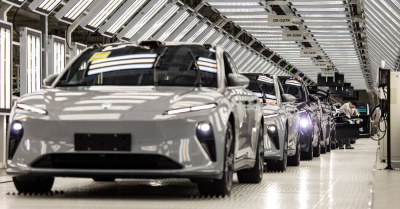纽约时报中文网 - 英文原版-英Biden Calls Chinese Electric Vehicles a Security Threat
March 1, 2024 4 min 808 words
拜登称中国电动车为安全威胁,不禁让人思考其言论的深层次含义。这一言论或许是对中美科技竞争的警觉,但也可能是一种过度的战略猜测。在全球汽车市场上,中国电动车正崭露头角,技术实力不可忽视。拜登此言或是为了推动美国自主研发,但过于敌视可能阻碍合作,不利于全球应对气候变化。对话与合作是解决问题的关键,而非过度的战略对抗。如何在科技发展中保持竞争与合作的平衡,是当前国际关系亟需思考的课题。
President Biden took steps on Thursday toward blocking internet-connected Chinese cars and trucks from entry to the American auto market, including electric vehicles, saying they posed risks to national security because their operating systems could send sensitive information to Beijing.
The immediate action was the opening of a Commerce Department investigation into security threats, which could lead to new regulations or restrictions on Chinese vehicles.
But administration officials made clear it was the first step in what could be a wide range of policy responses meant to stop low-cost Chinese electric vehicles — either manufactured in China or assembled by Chinese companies in countries like Mexico — from flooding the U.S. market and potentially driving domestic automakers out of business.
China has rapidly scaled up its production of electric vehicles in recent years, setting it on a collision course with Mr. Biden’s industrial policy efforts that seek to help American automakers dominate that market at home and abroad. Some of its smaller cars sell for less than $11,000 each — significantly less than a comparable American-made electric vehicle.
The administration’s actions on Thursday come as Mr. Biden’s likely opponent in November, former President Donald J. Trump, criticizes him for pushing automakers toward electric vehicles — and as each of the candidates tries to cast himself as tougher on China.
The measures stemmed from conversations with Detroit automakers, union autoworkers and the E.V. giant Tesla, which was recently supplanted by Chinese company BYD as the world’s biggest seller of electric cars.
“China is determined to dominate the future of the auto market, including by using unfair practices,” Mr. Biden said in a statement accompanying the announcement. “China’s policies could flood our market with its vehicles, posing risks to our national security. I’m not going to let that happen on my watch.”
Thursday’s action did not immediately impose new barriers on Chinese electric vehicles, which already face high tariffs and have not yet penetrated the growing American market for clean energy cars.
At Mr. Biden’s direction, the Commerce Department has begun an investigation into the threat from technology embedded in Chinese electric vehicles. That includes Chinese-made versions of common automotive software, which administration officials said could track where Americans drove and charged their vehicles, or even what music or podcasts they listened to on the road.
Administration officials noted that American auto manufacturers that sold vehicles to customers in China were essentially forced by Chinese officials to use Chinese software in their vehicles.
The announcement was the latest example of Mr. Biden’s moving to ramp up technology restrictions on China, and continued a bipartisan trend toward more antagonistic trade relations between the world’s largest economies. The Commerce Department investigation ordered by Mr. Biden marks the first use of a new authority established under an executive order issued in 2019 by Mr. Trump.
Biden officials said the investigation could result in new American restrictions on vehicles that depended on software from China.
Administration officials are eyeing other steps to further impede imports of Chinese vehicles, which have already surged through European markets, as a result of low prices driven in part by significantly lower labor costs. That could include increasing a 25 percent tariff on China’s vehicles.
“We’ll certainly continue to look at a range of policies to make sure that our carmakers and our autoworkers continue to be the most competitive in the world,” Lael Brainard, who heads the president’s National Economic Council, said in an interview.
The Treasury Department has already proposed rules meant to limit China’s ability to supply materials for cars and trucks that qualify for a $7,500 electric vehicle tax credit included in Mr. Biden’s signature climate bill.
The Commerce Department investigation announced on Thursday grew from a series of conversations that administration officials had with automakers last fall, after the settlement of a United Automobile Workers strike during which Mr. Biden stood with the union and joined a picket line. The carmakers told administration officials about the restrictions they faced selling in China, including on software.
Biden aides began to grow concerned about what might happen if the United States did not impose similar restrictions on Chinese software, which administration officials say only a handful of cars in America run on today.
China is “flooding foreign markets with their autos,” Ms. Brainard said. “Many of those vehicles can connect on a continuous basis with our infrastructure potentially, with the drivers’ smartphones, with nearby cars. So they’re collecting a tremendous amount of information.”
In a briefing call with reporters, Gina M. Raimondo, the commerce secretary, said it was “scary to contemplate the cyberrisks, espionage risks, that these pose.”
Ms. Brainard stressed that Thursday’s action was limited to software concerns. But she added, “It’s also very important for our economic security and our national security to have a strong and vibrant U.S. auto industry, with U.S. autoworkers.”

